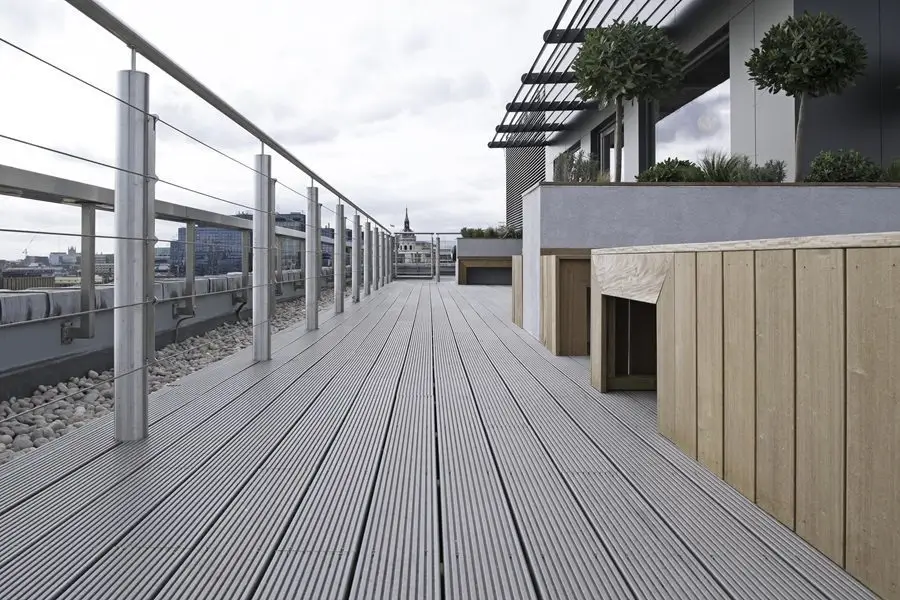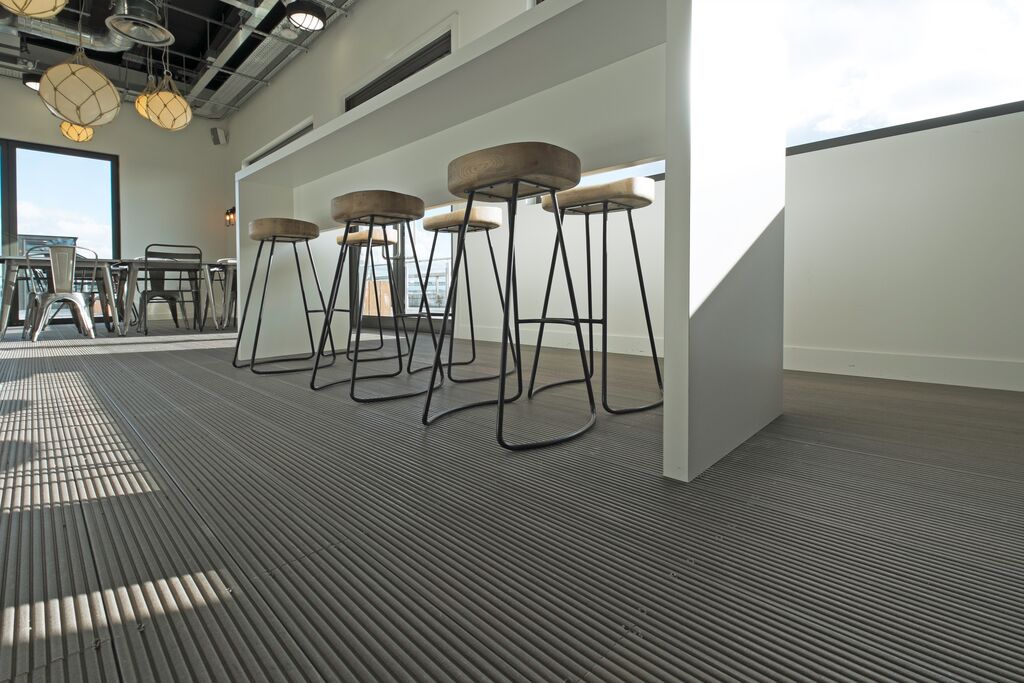When specifying decking for commercial or domestic landscaping projects, there’s often a decision to be made between timber and composite materials. In this post we’ll compare the two main types of decking, taking into account:
- Durability
- Longevity
- Maintenance
- Sustainability
- Safety
- Cost
What is composite decking?
Composite decking is a man-made product that is made from wood fibres and plastic (recycled or new) and binding agents. The percentage of wood versus plastic varies, depending on the manufacturer. These materials are blended together and heated, then cooled and moulded into shape.
The addition of plastic to the wood mixture gives the product its low maintenance properties and increases its durability, whilst the wood fibres still allow the boards to look like ‘real-wood’.
There are a number of different types of composite deck boards including hollow or solid composite decking and capped or uncapped composite decking.
Composite decking: pros and cons
Advantages of composite decking
Longevity: Composite decking is engineered to last. It’s composition of wood and plastic helps protect it from the elements. Unlike timber, it does not rot or splinter, and when fitted correctly it will not warp. That’s why it often comes with a lengthy warranty (Ecodek commercial decking collections have a 25 year warranty)
Maintenance: Very little maintenance is required to keep composite decking looking its best. There’s no sanding, sealing or painting, it just requires a quick brush down and clean with warm soapy water.
Sustainability: If eco-credentials are important, composite decking delivers. Make sure to look for a product that uses sustainably-sourced wood (FSC® and PEFC certified) and recycled plastic as raw materials.
Safety: Any commercial flooring – including decking surfaces – must have a Pendulum Test Value (PTV) rating of 36 or more under both wet and dry conditions. Many commercial composite decking boards will meet this criteria. Just ask for slip test data.

Disadvantages of composite decking
Cost: Composite decking can sometimes be more expensive than timber decking, but this will depend on the final materials chosen – and their quality (for example, some quality hardwood boards will be more expensive than cheap, hollow composite boards). Remember to consider the lifetime value of the product!
Durability of cheap imports: Whilst timber deck boards are stronger than composite boards, the latter can easily withstand heavy footfall in commercial spaces – if you chose a quality board. For optimum strength and durability, choose a solid composite board, as these are much more hard wearing than hollow alternatives.
What is timber (wood) decking?
Timber decking is a natural product that is machined into the required profile. Timber decking can be made from hardwood such as iroko, sapele, or oak, or softwood. Softwood is a much cheaper alternative and is pressure treated to protect the wood.
Timber decking needs treating and regular maintenance to keep it looking it’s best and to protect it from rot and insect infestation.
Timber decking: Pros and cons
Pros of timber decking:
Natural looking: If the aim of the decking is to look as natural as possible, timber wins. And there are some beautiful species of wood to choose from. However, there are still some good composite imitations available.
Easy to repair: It’s fairly easy to sand down and re-treat a timber deck board, whilst composite boards that get badly scratched may need replacing.

Cons of timber decking
Weathering: Timber decking can rot, fade, splinter, and warp over time, making it unsafe and uncomfortable to walk on. Boards may also need replacing after a few years – in particular softwood options.
High maintenance: Timber decking can be very high maintenance. It will require regular treatments to keep it looking its best and to safeguard it from the weather, which takes both time and money.
Safety: When wet, timber decking can be very slippery – not ideal for safety in public places.
Composite decking or timber decking – Making a decision
If you’d like further information about the pros and cons of wood composite decking, our friendly decking experts can help. Call them today on 01978 667 840.
